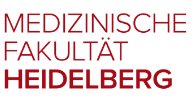![[Translate to English:] Portrait von Prof. Dr. med. Wolfgang Wick](/fileadmin/_processed_/b/5/csm_Wick_6ea0ff074a.jpg)
Prof. Dr. med. Wolfgang Wick
Medical Director
(Neurologie und Poliklinik)
Center spokesperson
(Zentrumsvorstand Kopfklinik)
Center spokesperson
(Head clinic (centre))
Attending Physician
(Neuro 03 - Neurologische Wahlleistungsstation)
Head of the Institute
(Clinical Cooperation Unit)
Head of the Institute
(Neurooncology Clinical Trial Research Program)
Attending Physician
(Schlaganfallkonsortium Rhein-Neckar)
Managing Director
(Neurological Clinic)
Spokesperson
(SFB 1389 UNITE Glioblastoma)
Medical/Professional background
- since January 2007
Ärztl. Direktor und Professor für klinische Neuroonkologie, Abt. Neuroonkologie/NCT, Universität Heidelberg
Leitung der KKE Neuroonkologie am DKFZ
- April 2006 – December 2006
Stellv. Ärztl. Direktor, Abt. Allgemeine Neurologie, Universitätsklinik Tübingen
- since October 2005
Lenkungsausschuss der Hirntumorgruppe der EORTC
- August 2004 – December 2006
Oberarzt für Neurologie
- April 2003
Facharztanerkennung für Neurologie
- January 1998 – June 1999
AiP in der Abteilung Neurologie, Universität Tübingen (Prof. Dr. J. Dichgans)
- November 1997
Vorläufige Approbation
- June 1997 – November 1997
Universität zu Bonn
- September 1996 – May 1997
Harvard Medical School, Boston, USA
- July 1994 – August 1996
Universität zu Bonn
- September 1993 – June 1994
King's College London, GB
- October 1990 – August 1993
Universität zu Bonn: Medizin
Scientific background
- August 2003 – October 2008
Nachwuchsgruppenleiter Hematopoietic stem cells and glioma des Landes Baden Württemberg
- July 2003
Habilitation und Lehrbefugnis für Neurology
- January 2002 – December 2002
Wissenschaftlicher Mitarbeiter in der Abteilung Psychiatrie, Universität Tübingen (Prof. Dr. G. Buchkremer)
- July 1999 – December 2001
Wissenschaftlicher Mitarbeiter in der Abteilung Neurologie, Universität Tübingen
- May 1998
Promotion am Institut für Neuropathologie (Prof. Dr. O.D. Wiestler) der Universität Bonn
Commendations
- since 2009
Key Note Lecture beim World Federation of Neurooncology Meeting, Japan Mitglied der Faculty of the 1000 Medicine
- since 2006
Pette Preis der Deutschen Gesellschaft für Neurologie (DGN)
- since 2005
Sibylle-Assmus Preis für Neuroonkologie
- since 2003
Novartis-Preis für Klinische Forschung
- since 2001
Attempto-Preis für Neurobiologie der Universität Tübingen
- since 1997
Beste Promotion der Med. Fakultät in Bonn
Grants
- 1991 – 1997
Stipendiat der Studienstiftung des Deutschen Volkes
- since 1996
Forschungsstipendium des Boehringer Ingelheim Fonds
Professional memberships
NCT Direktoriums
Offices and posts held
- since October 2014
Ärztlicher Direktor der Abteilung Neurologie des Universitätsklinikums Heidelberg
- since June 2014
Sprecher der Neuroonkologischen AG der Deutschen Krebsgesellschaft (NOA)
- January 2010 – April 2014
Mitglied des Direktoriums der European Cancer Organization (ECCO)
- since January 2010
Mitglied des NCT Direktoriums
- since March 2009
Mitglied im Nachwuchsausschuss der Deutschen Krebshilfe
- since June 2009
Sprecher der EORTC Hirntumorgruppe
- since September 2008
Mitglied des Vorstands der European Association for Neurooncology
- July 2007 – June 2014
Vorstandsmitglied der Neuroonkologischen AG der Deutschen Krebsgesellschaft (NOA)
Klinische Schwerpunkte
Primäre Hirntumore (Glimme und Lymphome)
Hirnmetastasen
Neurologische Komplikationen von Krebserkrankungen
Neuroimmunologie
Wissenschaftliche Schwerpunkte
Zielgerichtete antiangiogene Therapie
Immuntherapie
Antiimvasive Therapie
Stammzelle
Koordination Klinischer Studien
Glioblastom:
- EORTC 26082: Radiation therapy and concurrent plus adjuvant: Temsirolimus (CCI-779)/RT followed by CCI-779 versus chemoirradiation with temozolomide in newly diagnosed glioblastoma without methylation of the MGMT gene promoter – a randomized multicenter, open-label, Phase II study.
- NOA-08: Temozolomid (one week on/one week off) versus Strahlentherapie in der Primärtherapie anaplastischer Astrozytome und Glioblastome bei älteren Patienten: eine randomisierte Phase III-Studie (Methvsalem).
- S039: Enzastaurin (LY317615) Before and Concomitant with Radiation Therapy, Followed by Enzastaurin Maintenance Therapy in Subjects with Newly Diagnosed Glioblastoma – a Multicenter, Open-label, Uncontrolled Phase II Study. DIRECTOR: Dose-intensified rechallenge with temozolomide, one week on, one week off in patients with recurrent or progressive glioblastoma.
- UKT-05: Chemoradiotherapy of Newly Diagnosed Glioblastoma with Intensified Temozolomide.
- APG-101: A phase II, randomized, open-label, multi-centre study of weekly APG101 + reirradiation versus irradiation in the treatment of patients with first or second progression of glioblastoma; Prüfplannummer: APG101_CD_002.
- EORTC 26101: Phase II trial exploring the sequence of bevacizumab and lomustine in patients with first recurrence of a glioblastoma.
- EORTC 26101: Phase III trial comparing bevacizumab plus lomustien and lomustine in patients with first recurrence of a glioblastoma.
- NOA-12: A phase I/II, randomized, open-label, multi-centre study of BIBF1120 + reirradiation (R-RT) versus reirradiation in the treatment of patients with first or second progression of glioblastoma.
- GAPVAC: Glioma Actively Personalized Vaccine Consortium phase I study
Anaplastische Gliome:
- EORTC 26054: Phase III trials comparing no adjuvant chemotherapy versus adjuvant therapy until progression for anaplastic glioma without 1p/19q loss. An EORTC/NCI-C/RTOG intergroup trial.
- NOA-04: Randomized Phase III Trial of Sequential Radiochemotherapy of Anaplastic Glioma With PCV or Temozolomide.


